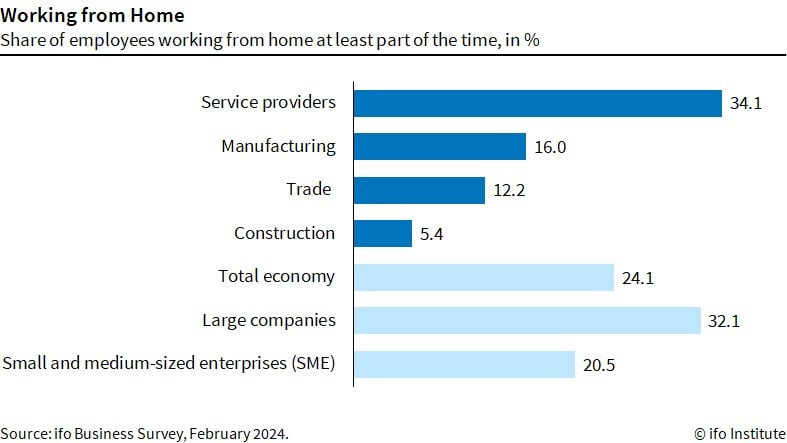Is 'Home Office' here to stay in Germany?

A new study shows that many working from home policies in Germany, introduced during the Covid-19 pandemic, are sticking around - even as some bosses call their employees back to the office.
Nearly a quarter of employees in Germany worked from home last month. One Munich-based economic think-tank says the Covid-era policy is likely to remain.
At the end of February, 24.1 percent of employees in Germany worked from home at least part of the time, according to a recent ifo Institute business survey of nearly 9,000 companies published this week.
“The proportion has remained almost constant for two years,” said Jean-Victor Alipour, ifo economist.“Regardless of the debates at individual companies about returning to the office, working from home has become firmly established in Germany.”
Covid-era policy shows staying power, despite pushback
Still the flexible work policy faces some resistance from management in the workplace. 68 percent of Germany’s top CEOs said their employees will return to the office full-time within the next three years according to a October 2023 KPMG survey.
KPMG survey analysts said the high percentage demonstrates “persistent, office centric thinking” among CEOs interviewed. More than three quarters of German CEOs interviewed for the survey said they would consider more incentives including promotions and boosted pay to bring employees back to the office.
Some German companies like Deutsche Bank and SAP began cracking down on work-from-home policies this year. Both faced criticism from employees after calling workers to return to the office.
Alipour said the data points to work from home policies surviving despite this trend.
 A man works on his laptop at home. Photo: picture alliance/dpa | Sina Schuldt
“No one denies that working in person is better than working from home when it comes to things like knowledge transfer, group creativity, and social aspects,” said Jean-Victor Alipour, ifo economist. “However, our data gives no indication that companies are getting rid of the option to work from home.”
A man works on his laptop at home. Photo: picture alliance/dpa | Sina Schuldt
“No one denies that working in person is better than working from home when it comes to things like knowledge transfer, group creativity, and social aspects,” said Jean-Victor Alipour, ifo economist. “However, our data gives no indication that companies are getting rid of the option to work from home.”
Work from home office policies remain more popular for larger companies. Ifo Institute found only one in five employees working at small and medium sized companies work from home. This is less than the nearly one in three employees at large companies who work from home at least part of the time.
And the German government offers advantageous tax deductions to workers who have a home office. The government introduced the Home Office Lump Sum in 2020 during the pandemic. Initially intended to provide taxpayers some relief, the lump sum tax deduction will apply indefinitely as of January 2023. Employees can deduct up to €1,260 per year from their annual tax bill.
READ ALSO: Germany to extend (and increase) tax rebate for people working from home
Work from home office policies differ across industries
Still the industry of work can also impact the likelihood of the policy being offered.
Work from Home Office is most widespread among service providers, with more than a third of employees working remotely at least part of the time. In manufacturing, the figure is 16 percent, while in trade it is 12.2 percent.
The construction industry finishes last with only 5.4 percent of employees working from home.

Work from office continues in startup sector
Work from home office policies remain popular in Germany’s start-up sector. Adebukola Malomo, founder and CEO of Berlin-based CLIQup, an app promoting social connection, said the work from home policies will not be disappearing anytime soon.
“I think remote work has come to stay, so many startups now try to adapt and move with the times,” he told The Local. “Employees also appreciate that flexibility and would prefer to work in companies that offer at least some form of remote work, a hybrid model being the most popular.”
Malomo said startups, like his own, prioritise work from home because it keeps costs low.
“It’s cheaper, as we don’t have to spend on office rent,” he said.
READ ALSO: Nearly a quarter of employees in Germany 'continue to work from home'
Comments
See Also
Nearly a quarter of employees in Germany worked from home last month. One Munich-based economic think-tank says the Covid-era policy is likely to remain.
At the end of February, 24.1 percent of employees in Germany worked from home at least part of the time, according to a recent ifo Institute business survey of nearly 9,000 companies published this week.
“The proportion has remained almost constant for two years,” said Jean-Victor Alipour, ifo economist.“Regardless of the debates at individual companies about returning to the office, working from home has become firmly established in Germany.”
Covid-era policy shows staying power, despite pushback
Still the flexible work policy faces some resistance from management in the workplace. 68 percent of Germany’s top CEOs said their employees will return to the office full-time within the next three years according to a October 2023 KPMG survey.
KPMG survey analysts said the high percentage demonstrates “persistent, office centric thinking” among CEOs interviewed. More than three quarters of German CEOs interviewed for the survey said they would consider more incentives including promotions and boosted pay to bring employees back to the office.
Some German companies like Deutsche Bank and SAP began cracking down on work-from-home policies this year. Both faced criticism from employees after calling workers to return to the office.
Alipour said the data points to work from home policies surviving despite this trend.

Work from home office policies remain more popular for larger companies. Ifo Institute found only one in five employees working at small and medium sized companies work from home. This is less than the nearly one in three employees at large companies who work from home at least part of the time.
And the German government offers advantageous tax deductions to workers who have a home office. The government introduced the Home Office Lump Sum in 2020 during the pandemic. Initially intended to provide taxpayers some relief, the lump sum tax deduction will apply indefinitely as of January 2023. Employees can deduct up to €1,260 per year from their annual tax bill.
READ ALSO: Germany to extend (and increase) tax rebate for people working from home
Work from home office policies differ across industries
Still the industry of work can also impact the likelihood of the policy being offered.
Work from Home Office is most widespread among service providers, with more than a third of employees working remotely at least part of the time. In manufacturing, the figure is 16 percent, while in trade it is 12.2 percent.
The construction industry finishes last with only 5.4 percent of employees working from home.

Work from office continues in startup sector
Work from home office policies remain popular in Germany’s start-up sector. Adebukola Malomo, founder and CEO of Berlin-based CLIQup, an app promoting social connection, said the work from home policies will not be disappearing anytime soon.
“I think remote work has come to stay, so many startups now try to adapt and move with the times,” he told The Local. “Employees also appreciate that flexibility and would prefer to work in companies that offer at least some form of remote work, a hybrid model being the most popular.”
Malomo said startups, like his own, prioritise work from home because it keeps costs low.
“It’s cheaper, as we don’t have to spend on office rent,” he said.
READ ALSO: Nearly a quarter of employees in Germany 'continue to work from home'
Join the conversation in our comments section below. Share your own views and experience and if you have a question or suggestion for our journalists then email us at [email protected].
Please keep comments civil, constructive and on topic – and make sure to read our terms of use before getting involved.
Please log in here to leave a comment.